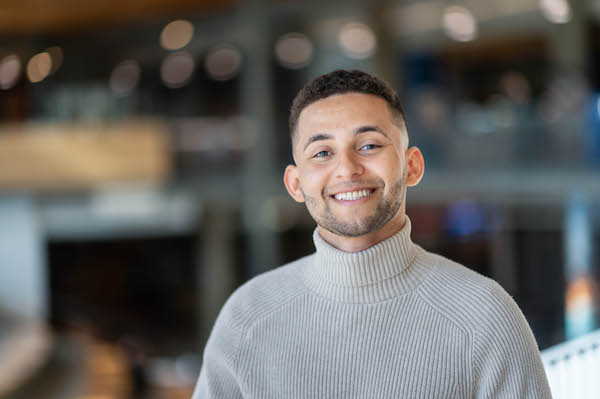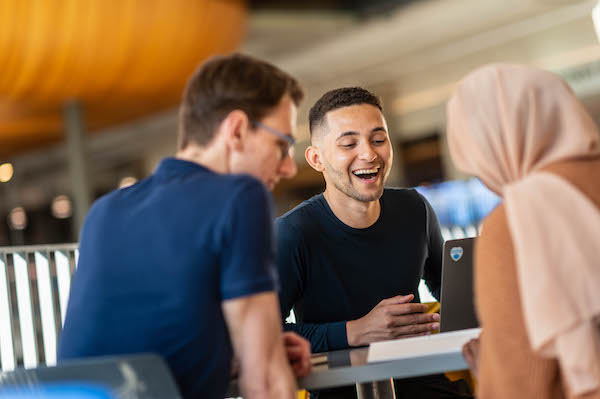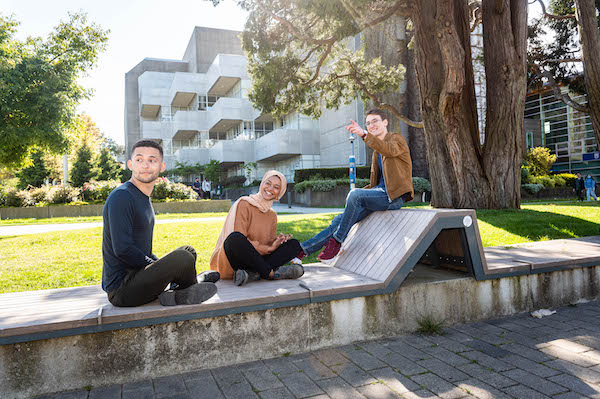Danilo, an alum of UBC’s Honours Political Science with International Relations program, chose UBC because it’s the most international university in North America. He wanted the opportunity to connect with people from all over the world with different identities and experiences.
Throughout his time at UBC he wrote his honours thesis on international criminal law, became a Human Rights Researcher, co-directed a documentary about COVID-19-related Sinophobia and Asian hate, and started a series of conflict resolution conversations to have unique discussions about life in conflict zones.
With a passion for international justice, Danilo wants to understand different perspectives and challenge us to think beyond our biases.
UBC is full of opportunities to connect and engage, both in and out of the classroom. What opportunities have you seized, and how do they enrich your experience here?
UBC’s motto is Tuum Est, which means It’s Yours, and It’s Up to You. Throughout my time at UBC I have strived to become the best version of myself, to grow, and to make university my own experience.
An opportunity that significantly shaped my experience was the ability to conduct research on ways to prevent international crimes and hold responsible parties accountable. More specifically, for my honours thesis I argued that, because preliminary examinations by the International Criminal Court (ICC) involve high-cost operations and comprehensive reports, it serves as a credible commitment signal to perpetrators that the ICC is willing to take further and serious actions for the pursuit of justice. Thus, perpetrators are more likely to scale down the intensity of atrocities. The results of the quantitative study that I conducted—spanning 15 years across 46 countries—are consistent with this theory.
I also became a Human Rights Researcher for the Scholars at Risk & Human Rights Collective at UBC where I advanced the understanding of how COVID-19 affected the academic freedom of Latin American scholars. My findings were presented in two national conferences and allowed me to advocate for these Scholars. This experience enriched my experience at UBC by allowing me to further develop my knowledge of human rights issues, which I also applied in other internship opportunities.
UBC also offered me the opportunity to learn from experts and co-direct a documentary, which is something that I never imagined myself doing. The documentary titled Racism is the Virus touches on COVID-19-related Sinophobia and Asian hate in Italy and Canada, with the goal of combating misinformation and racial stigma, and humanize the issue of racism by giving voice to victims of Sinophobia and anti-Asian attacks. This opportunity enriched my experience at UBC by allowing me to challenge myself significantly.
I believe that knowledge is infinite, and I will always be extremely grateful to UBC and its amazing faculty for allowing me to explore my passion for international justice. UBC has taught me that we have power to redefine our generation and our future.
UBC is a mosaic of people, experiences and locations that come together to make it unlike anywhere else. What are some of your favorite places, communities and experiences to explore at UBC?
During the second semester of my first year, I took the initiative to start a series of conflict resolution conversations named “Let’s Talk About” where I partnered with the International Relations Students Association. “Let’s Talk About” features different countries, cities and ethnic groups that are the center of violence around the world. More specifically, my goal has been to humanize conflict-related issues and go beyond what the media shows. This series is intended as an exchange of experiences among students and an opportunity to have unique conversations about life in conflict zones. Throughout the years we have had “Let’s Talk About”: Palestine, Syria, Pakistan, Hong Kong, India, Brazil, and The Kurds.
“Let’s Talk About” is one of my favourite communities and experiences at UBC because it has allowed me to learn from others and give a voice to UBC students to express their opinions, concerns and personal stories. More specifically, I have learned that rather than spending time finding out who is right or wrong, one can practice active listening, empathy and dialogue as important components that allow us to fully understand different perspectives and challenge ourselves to think beyond our biases.
“Let’s Talk About” is also one of my favourite communities because it has allowed me to get out of my comfort zone by spearheading and exploring something new. UBC has over 350+ clubs where one can find a community, but UBC also offers resources to create new communities that do not yet exist, and creating “Let’s Talk About” as a series of conflict resolution conversations is a testament of that.
Have you had the opportunity to connect with people of different identities/experiences from you? How have these diverse connections impacted your experience?
One of the main reasons why I chose UBC is because it is the most international university in North America. Here, I have had the opportunity to connect with people of different identities and experiences in and outside the classroom. These diverse connections have positively impacted my experience to a great level by providing me a sense of global citizenship, making me more aware of different issues, allowing me to see things from a totally different perspective, and teaching me the importance of empathy.
The different communities that I have created at UBC have provided me a strong sense of belonging, whether that is hanging out with my friends, meeting new people through clubs and classes, reaching out to people to get involved and find their own community, or providing tours to prospective students as a Student Ambassador.
The location of UBC’s Vancouver campus is truly unique, with its mix of urban settings and natural retreats. How does our location impact your experience here, and what are some of your favorite ways to take advantage of it?
I like to believe that UBC is a city within a city. Being located on a peninsula and being surrounded by the Pacific Ocean, Pacific Spirit Regional Park, and the mountains is one of my favourite components of UBC because it allows me to deeply connect with myself and with the environment.
One of my favourite ways to take advantage of the location of UBC is by catching sunsets with my friends at different spots on campus such as Wreck Beach, Tower Beach, and the Rose Garden. I love sunsets at UBC because they are ineffable, and each one of them has reminded me of how fortunate I am to live and study in the most beautiful place on earth. Another way to take advantage of the location of UBC is by biking and walking around campus while appreciating the mix of urban settings and natural retreats that make me feel like I am in a movie.


